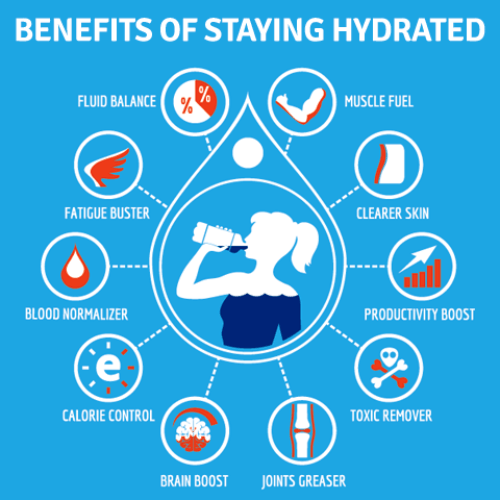Waking up dehydrated is no fun. It’s one of those mornings when you can’t shake the feeling that something isn’t quite right.
You feel weak and your throat is dry, but you don’t know why. Before you reach for a glass of water, let’s take a look at what dehydration is, and how to prevent it from happening again.
Dehydration happens when you lose more fluids than you take in. Your body needs enough water to keep all its systems running smoothly, and if there’s not enough, it starts to suffer.
Most people don’t realize that dehydration can happen while they sleep! This type of dehydration can leave you feeling sluggish and out of sorts in the morning. Fortunately, there are steps we can take to make sure that doesn’t happen again.
In this article, we’ll explore what causes dehydration while sleeping, and how to make sure it never happens again.
Causes Of Waking Up Dehydrated

Waking up dehydrated is like being stranded in the desert with no oasis in sight.
Dehydration has many causes, but the most common are a lack of water intake and excessive sweating.
To begin with, not drinking enough water throughout the day can lead to dehydration when you wake up.
If your body does not receive an adequate amount of fluids, it begins to pull moisture from other areas such as your muscles and organs.
This can cause fatigue and headaches when you wake up.
Sweating excessively while sleeping can also contribute to dehydration.
Sweating is one of your body’s ways of cooling off and regulating temperature, but if it’s too hot or humid in your bedroom, you may be losing more fluid than usual without realizing it.
The last cause is something called night sweats which are different from regular sweat because they may be caused by underlying medical issues such as certain illnesses or medications.
Whatever the cause of night sweats, they can lead to dehydration if left unchecked.
These are just a few causes of waking up dehydrated – now let’s look at the symptoms that come along with it…
Symptoms Of Dehydration
Like a man in the desert, dehydrated individuals often feel parched, disoriented and exhausted.
All too often we find ourselves waking up in this state, unaware of how we got there.
Allusion to ancient explorers serves as a reminder that dehydration is an age-old struggle faced by many people today.
Symptoms of dehydration can vary from person to person, but most commonly they include dark-colored urine, fatigue, dry mouth and eyes, dizziness and headache.
These are all signs the body provides when it’s lacking in the necessary amount of water needed to keep us healthy and functioning properly.
In some cases these symptoms can become more severe if left untreated for a long period of time leading to heat stroke or other serious medical issues.
It’s important to listen to our bodies and take steps towards correcting dehydration early on before it gets worse.
If you’re unsure how much water your body needs or what activities could be depleting your water intake then consulting with a doctor or health professional is recommended.
Taking action now can help avoid costly trips to the hospital later on down the road when more serious complications may arise due to chronic dehydration.
With proper care and hydration habits, we can all stay on top of our health and prevent these undesirable symptoms from occurring.
Effects Of Chronic Dehydration
It is a common belief that chronic dehydration can have an impact on one’s body and mind. But, is this true?
Chronic dehydration can certainly have negative effects on the body, but what about for those who are waking up dehydrated?
The truth is that chronic dehydration can lead to some serious health issues if left untreated.
It can cause fatigue, headaches, dry mouth, dark urine, and dizziness. These symptoms can linger throughout the day and make it difficult to perform daily activities.
Moreover, long-term dehydration can cause serious problems such as kidney stones or even organ failure.
In addition to physical symptoms, chronic dehydration can also lead to mental issues such as difficulty concentrating and irritability.
The lack of water in the body leads to decreased oxygen levels in the brain which reduces focus and alertness.
This can be especially detrimental for those who are trying to wake up after a night of poor sleep due to dehydration.
Therefore, it is important for people who are waking up dehydrated to take steps towards rehydrating their bodies as soon as possible in order to minimize any negative effects from their condition.
Rehydrating will not only help reduce physical symptoms but could also boost cognitive function throughout the day and improve overall quality of life.
Transitions into better hydration practices should be made with ease in order to ensure a healthy body and mind.
Dehydration And Sleep Quality

Sleep is a vital part of life, and dehydration can have a significant impact on it.
A recent survey found that nearly 40% of people struggle with insomnia due to dehydration.
That’s why it’s important to recognize the signs and take steps to reduce dehydration before bed.
Dehydration interferes with your body’s natural circadian rhythm, making it difficult to fall asleep and stay asleep during the night.
It also affects the brain’s ability to process information, meaning you may wake up feeling groggy and confused.
Waking up dehydrated can leave you feeling fatigued, foggy-headed, and unable to think clearly.
This can cause issues such as difficulty concentrating or remembering things throughout the day, which can be detrimental to your productivity levels.
Taking steps to reduce dehydration before bedtime can improve sleep quality and help ensure that you wake up feeling refreshed and alert.
By understanding how dehydration impacts sleep quality, we can take actionable steps towards improving our overall health and well-being.
Strategies To Reduce Dehydration Before Bed
Have you ever woken up dehydrated and feeling exhausted? It’s a terrible feeling, and it can be an indicator that something is wrong with your hydration habits.
So, what strategies can you use to reduce dehydration before bed?
Let’s take a look.
Firstly, reducing the amount of caffeine consumed throughout the day is key.
Caffeine is a diuretic which causes dehydration, so limiting your intake can help ensure better hydration when you go to sleep.
Secondly, drinking plenty of fluids–especially water–throughout the day will keep you hydrated while also helping your body process nutrients more effectively.
Lastly, avoiding alcohol in the evenings can help prevent dehydration as alcohol has a dehydrating effect on the body.
These strategies are important for keeping yourself properly hydrated before bed each night.
Taking these steps will help ensure better sleep quality and overall health.
With proper hydration habits in place, now let’s move onto hydrating foods to eat before bed.
Hydrating Foods To Eat Before Bed
The night air is still and the darkness envelops.
A dull ache in the head, a dryness in the throat – an all-too-familiar feeling of waking up dehydrated. But it doesn’t have to be this way.
Fortunately, there are steps we can take before bedtime to reduce dehydration.
One such step is to eat hydrating foods, which can help us get the fluids that our bodies need.
Bananas, cucumbers, melons and spinach are all excellent sources of hydration, with high water content and plenty of essential vitamins and minerals.
Not only do they quench thirst but they also provide essential nutrients for our overall health.
Additionally, adding citrus fruits like oranges or grapefruit to meals can add a burst of flavor while helping keep us hydrated.
Eating food before bedtime also helps promote quality sleep by providing energy for the body through the night.
These hydrating snacks can make a big difference when it comes to avoiding dehydration during sleep.
From promoting better sleep to providing vital nutrients, these simple tips can help us feel recharged and refreshed in the morning – ready for whatever comes next.
Benefits Of Keeping Hydrated

Hydration is important, and there are many benefits to staying hydrated.
Being dehydrated can cause headaches and fatigue, so it’s important to get enough fluids. Knowing how much water you need and what foods to eat can help you stay hydrated.
Keeping your body hydrated helps maintain healthy blood pressure levels, as well as support good digestion and regularity.
It also helps ensure the proper functioning of all your organs.
Additionally, dehydration can lead to a decrease in cognitive performance, making it harder to concentrate or focus on tasks.
When we’re dehydrated, our bodies don’t work as well – muscles and joints may become sore or stiff.
Headaches are more frequent when we don’t get enough fluids; so it’s best to drink plenty of water throughout the day and make sure you’re getting enough electrolytes in your diet.
To keep yourself feeling energized and healthy, it’s essential that you drink enough water every day.
Eating hydrating foods can also help ensure that your body has the fluid it needs.
Hydrating Drinks To Get Enough Fluid
Staying hydrated is essential for a healthy lifestyle.
A shocking statistic is that 75% of Americans are chronically dehydrated. With the right knowledge, everyone can stay hydrated and benefit from it.
There are many ways to get enough fluids in your body; one of the best ways is to drink hydrating drinks.
Water is always an excellent option, but there are other options like herbal teas, coconut water, juice diluted with water, or electrolyte-rich sports drinks which are also great choices.
All of these drinks provide the body with necessary minerals and electrolytes while helping rehydrate faster than just drinking water alone.
It’s important to make sure you’re drinking enough throughout the day as dehydration can cause fatigue and lead to other serious health issues if not addressed quickly.
By making hydrating drinks part of your daily routine, you can ensure you’re getting all the fluids and minerals you need.
A balanced diet and exercise regimen helps too – but staying hydrated should be a priority for everyone looking for a healthier lifestyle.
Home Remedies To Rehydrate Quickly
Have you ever woken up feeling parched and dehydrated? Rehydrating quickly is essential to feeling your best.
Here are a few home remedies to get you back on track fast:
- Drink a glass of water with lemon or lime. Citrus fruits are high in electrolytes, which help your body retain fluids.
- Make a hydrating smoothie with coconut water, banana, and spinach. Coconut water is rich in potassium, an important electrolyte for rehydration. Bananas contain many vitamins and minerals that help replenish your body’s fluids. Spinach is rich in folate, which helps restore energy levels and aids recovery from dehydration.
- Eat some yogurt or cottage cheese with fruit for a snack. Yogurt contains probiotics that help the body absorb more water and fight off illnesses like diarrhea that can lead to dehydration. Cottage cheese is high in sodium, another important electrolyte for hydration.
- Suck on an ice cube or drink some chilled herbal tea throughout the day to stay hydrated and cool down at the same time. Herbal teas such as chamomile, lavender, or peppermint have calming properties that can also contribute to restoring balance and energy levels after rehydration has been achieved.
These home remedies offer quick solutions to getting rehydrated fast without having to seek medical attention right away.
The next step is finding out when dehydration requires medical attention…

When To Seek Medical Attention For Dehydration
Dehydration can become a serious health issue. Knowing when to seek medical attention is important.
If you wake up dehydrated, it’s best to start with simple home remedies. Drink fluids, rest and take electrolytes. But if the dehydration doesn’t improve within 24 hours, it’s time to see a doctor.
Symptoms like dizziness, confusion or a rapid heartbeat indicate more severe dehydration that requires medical help.
Other signs of extreme dehydration include sunken eyes, dry mouth, low blood pressure and a lack of urination for more than 8 hours.
If any of these are present, it’s important to get medical care right away as dehydration can quickly cause other health complications.
Take action quickly if you suspect severe dehydration as it can be fatal if left untreated.
Don’t wait for symptoms to worsen: seek help from a trained professional who can provide the necessary treatment plan.
Frequently Asked Questions
How Much Water Should I Drink During The Day To Stay Hydrated?
Staying hydrated is essential for a range of bodily functions.
So, how much water should you drink during the day to stay hydrated? Here’s what you need to know:
Firstly, your daily water intake depends on several factors, including your body weight, physical activity levels and climate.
Generally, you should aim to drink between 2 and 3 liters of water per day.
Making sure you have enough water with you can help keep up your intake. You can do this by carrying a reusable water bottle with you throughout the day or setting reminders on your phone to sip regularly.
If drinking plain water isn’t for you, try having herbal teas or adding fruits such as lime and cucumber slices to add flavor.
Hydration is key for keeping healthy and alert. Monitor how often and how much you are drinking each day to ensure that your body stays in top form!
How Can I Tell If I Am Dehydrated?
Dehydration is a tricky thing; it can sneak up on you before you know it. Figuratively, it’s like a thief in the night – you never know when it will hit. So how can you tell if you are dehydrated?
There are some signs that your body may give off if it needs more water. You might feel light-headed, or have dry mouth or eyes. If you haven’t peed in a while or the color of your urine has changed to a darker yellow, this could be an indication as well.
You may also feel fatigued, dizzy and have difficulty concentrating. If any of these symptoms sound familiar, then chances are that dehydration is the culprit.
Reach for some water right away and continue to drink throughout the day to keep your body healthy and hydrated.
Don’t let dehydration take control; listen to your body and stay ahead of the game!
What Are The Signs Of Dehydration In Children?
As the summer heat rises, children become increasingly vulnerable to dehydration. But what are the signs that parents should look out for? It’s vital to know, and can be the difference between life and death.
First off, it’s important to recognize the danger signs.
Thirst, fatigue and headaches are all symptoms of dehydration in kids – but there’s a lot more than just these.
Dry mouth, decreased urine output and a sunken fontanelle (the soft spot under a baby’s scalp) can also indicate that your child needs more fluids fast.
The key is prevention – get ahead of things before they become a problem. Make sure your children are drinking plenty of water throughout the day, and if they’re playing sports or doing any strenuous activities outside in hot weather then ensure they keep hydrating regularly.
If you’re ever in doubt about their hydration levels, taking their pulse is one way to check – if it’s too high then your kid may need rehydrating ASAP.
We all want our kids safe and healthy during this summer season – so recognizing the warning signs of dehydration could be a lifesaver for them down the line.
Keep an eye out for these signals, make sure your little ones stay hydrated, and let them have fun in this sunshine-filled time of year!
Is It Safe To Drink More Than 8 Glasses Of Water A Day?
The question of whether it is safe to drink more than 8 glasses of water a day has arisen. It’s important to consider the risks and benefits before making any decisions.
Firstly, it’s important to know that drinking too much water can be dangerous. Hyponatremia, or low sodium levels in the blood, can occur if you drink too much.
Symptoms include nausea, headache, confusion and fatigue. It’s best to check with your doctor if you’re thinking of changing your water intake significantly. On the other hand, there are many benefits to drinking more than 8 glasses of water a day.
Staying hydrated helps keep your body functioning properly and helps maintain healthy skin and organs. It also helps reduce hunger cravings and aids digestion. Drinking plenty of water can also help prevent headaches and fatigue caused by dehydration.
It’s important to weigh up the risks and benefits for yourself before making any decisions about how much water you should drink each day. Make sure you talk to your doctor first if you have any health concerns or questions about increasing your daily water intake.
Conclusion
I’m sure we’ve all experienced waking up dehydrated. It’s not a pleasant feeling. It’s like being stuck in the desert with no water in sight.
You feel parched and it can be difficult to concentrate on anything else.
Knowing how much water to drink throughout the day, understanding the signs of dehydration, and monitoring your hydration levels are key to avoiding this feeling.
Children may have more difficulty recognizing these signs, so it’s important for parents or guardians to keep an eye out for them.
It’s best not to overdo it either; eight glasses of water a day is usually enough for most people.
But if you’re ever unsure, it’s always best to consult with your doctor first before making any changes to your fluid intake.
By following these simple steps, you can avoid that parched desert feeling and stay adequately hydrated each day!





